In 2008, I got to find out firsthand why entrepreneurs must become good at selling. I can say that while sales experience isn’t a prerequisite for starting a business, an openness towards improving your salesmanship is. You need it in order to pull others towards your vision, persuade prospects that you have a differentiator, and in many cases, you are the first one to ask your first customer for money.
I was fortunate to hear about Bob Burg early on in my entrepreneurial sales education cycle and his philosophies helped me mold how I think about the world of sales. His book ‘The Go-Giver’ that he co-authored with John David Mann was such a hit in the networking circles that I recall asking someone about who the speaker is for an event I was attending and they simply responded with, “The Go-Giver is speaking”. After absorbing Bob’s message, I came out of it with a refined philosophy on sales …
I will authentically give value to those I truly connect with and play the long game with no strings attached. Wow, this feels good, natural and not the usual transactional way of selling. This is how I will approach sales.
Recently, Bob was inducted into the National Speakers Association Hall of Fame. That is all you need to know about this man’s charisma, delivery, and inspiration. It’s quite impressive when you parlay that fact with the several books he’s written, most notably Endless Referrals and the Go-Giver series of books. I was very excited to meet him for the second time to see what I could learn …
[Setting: I met Bob at the Renaissance Hotel near the airport. Before the meeting, my photographer, Pat, and I scoped out the well-lit lobby. The management was gracious enough to allow us to conduct the interview and to take pictures on the premises. It was sunny out, but as soon as the interview started, a monsoon came rolling in… ]
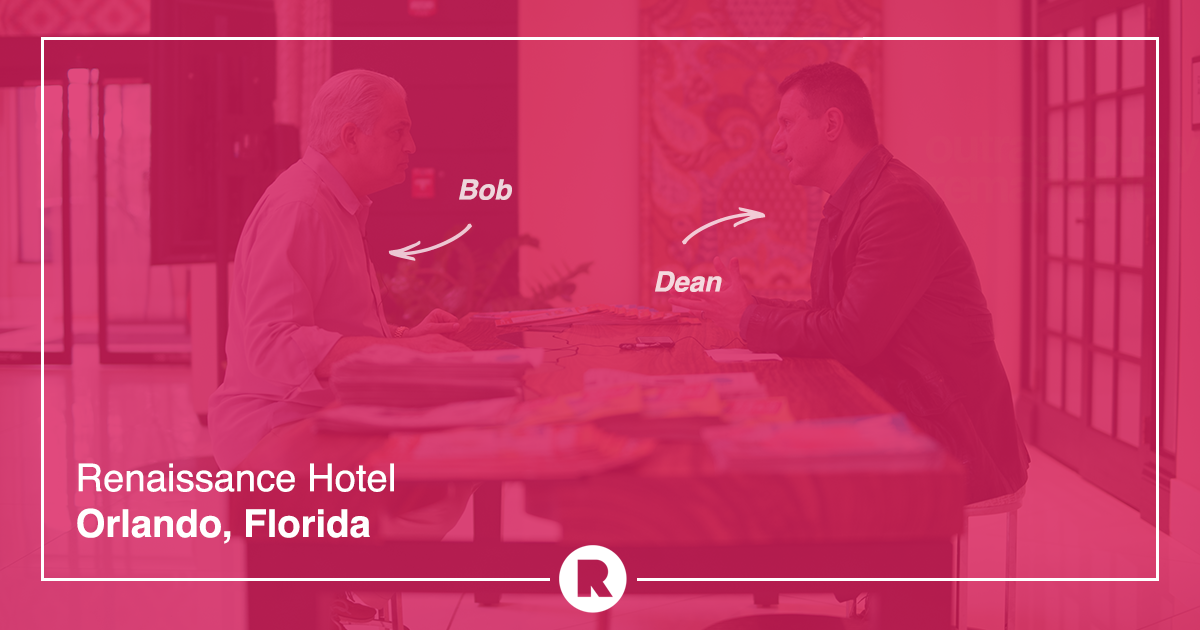
Dean: Alright Bob, about ten years ago, I remember that a friend of mine said, “Dean, wait until you turn 40, your memory is going to go.” I was like my memory is awesome, it’s not going to go. The funny thing is that yesterday I was picturing a football player and I could not think of his name and I was uh oh. The reason I’m saying this is because it’s funny that I forget these trivial things, but I can remember specific things that you mentioned about nine years ago. I have a question about one of them. I’ll just tell you real quick just as a way for us to connect about it. One of them was a tip you gave about when you’re working on influencing somebody to be able to help you with something …
Bob: Right, the eight key words, “if you can’t do it I’ll definitely understand” … and then to say, “if you could I’d certainly appreciate it.”
… excellence is the next 60 seconds.
Dean: One of the other things you mentioned in there is that how you do anything is how you do everything. That resonated with me. I wanted to ask, what does that mean to you today and is that some kind of mantra that you use for motivation?
Bob: Well, I heard that originally from T. Harv Eker. I used to speak at his conferences and I remember him saying that from the stage and then that was a theme from his book, Secrets of the Millionaire Mind. How you do anything is how you do everything. I love that saying. I don’t know if I’d say that I use it as a motivational mantra in order to motivate myself to do anything. I’d say that I use it more as a reminder as to why if I’m going to do something or if someone else is going to do something, it should be done the best we can regardless of what we’re doing. So yeah, I’d say it’s more of a life reminder and it’s something that is continual.
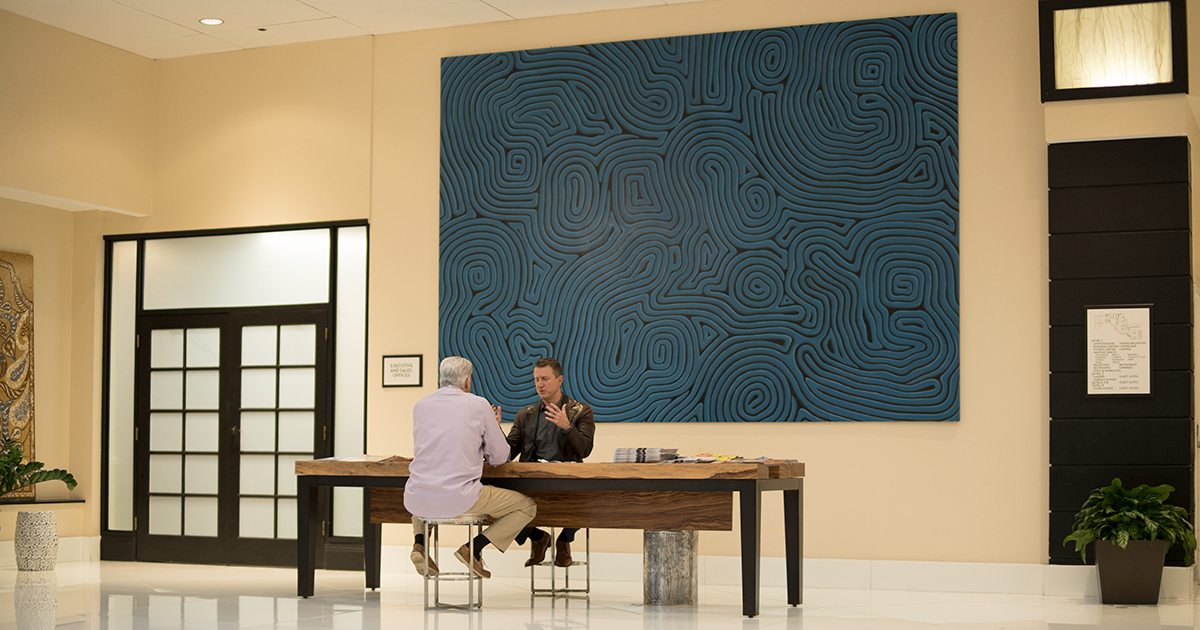
Dean: I think it’s just so important because even just hearing that from you, anytime I’m about to half-ass something, that pops into my mind. I think it’s a great philosophy to live by.
Bob: You know, Tom Peters wrote In Search of Excellence and a number of different books, he has a newer book out now called The Excellence Dividend. One of the things that Tom says is that excellence is the next five minutes and actually, he says that excellence is the next 60 seconds. In other words, whatever you are doing next, do it with excellence. It really doesn’t matter what you’re doing. It could be the email that you’re answering, it could be the compliment that you pay someone as you walk around the halls, it could be whatever you are doing, just do it with excellence. I think that those two really connect.

Dean: I like the reminder to stay present, too. So the original Go-Giver book really had some staying power. When did you realize that you really had something and that it took on a life of its own?
These were captains of industry …
Bob: I think it was about six months or so before we really kind of knew that. Any book can have a good start and then fizzle out. John David Mann, my co-author, and I discovered that our early adopters, if you will, of the book were not the people who needed the message, but the people who were already living the message. These were captains of industry, they were sales leaders, they were writing to us and sending us emails saying this is what I’ve been telling people, this is what I’ve been trying to get my team to do, and you and John put it into words. But then, months later, the second wave of emails were from the people who heard about the book from people who were their mentors or their managers or their bosses, and that’s when we kind of got the idea that there was something here that was going to stick. We knew when we had the people who were already living their lives this way long before they read the book referring it to people who were then having great results when they were using it. That’s when we knew that we had something.
… shifting your focus from getting to giving …
Dean: The philosophy is just incredible because I think that everybody is in sales to some capacity, but I think when you are in sales, it’s just a reminder of being able to put good juju into the system, or whatever you want to call it.
Bob: We would say it’s bringing value to everything you do. We say the premise of the Go-Giver is that shifting your focus from getting to giving – giving in this context meaning constantly and consistently providing value to others – is not only a pleasant way of conducting business, it’s the most financially profitable way as well.

Dean: I think one thing that I have heard about that philosophy is that people are afraid of others taking advantage of them. What would you say to those people that say, well I got taken advantage of that one time?
Nobody is going to buy from you because you have a quota to meet.
Bob: They may be defining ‘giving’ as just giving yourself away or being a doormat or a martyr or self-sacrificial. That’s not what the Go-Giver is about. Go-Givers understand that when you focus on providing value, you’re going to get a return not from some mystical, magical reason, but based on human nature. Nobody is going to buy from you because you have a quota to meet. They’re not going to buy from you because you need the money or even because you’re a nice human being. They’re going to buy from you because they believe that they’ll be better off by doing so than by not doing so. Now, if you’re being taken advantage of, the chances are it’s not because you’re adding value to someone’s life, it’s because you’re doing things in your life in such a way that you allow yourself to be taken advantage of. Don’t get me wrong, sometime in our life, we’re going to be taken advantage of. It’s a big world out there. The only way to never be taken advantage of is to never do anything.
Dean: To never stick your neck out.
Bob: Right and you’ll live a very boring life, but you’ll probably never be taken advantage of. But, we’re talking about here people who habitually find themselves taken advantage of as a pattern … that’s not being a Go-Giver. In other words, there is no natural relationship between being a Go-Giver and being taken advantage of. If that’s happening, it’s not because you’re being a Go-Giver. It’s because you’re doing things in such a way that you’re creating the environment to be taken advantage of.
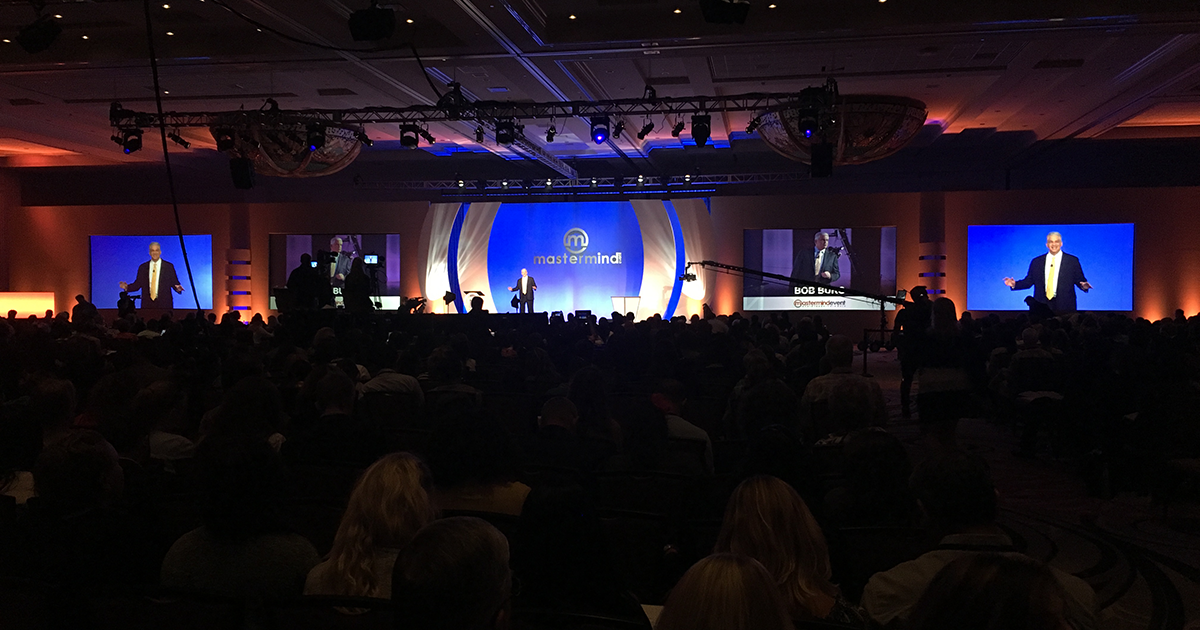
Dean: Would you be able to share any tips you have for delivering value on the front end in a sales environment?
Bob: On the front end in what regard?
Dean: Just early on, before even making the ask.
Bob: So let’s say that you’re developing a relationship with someone and it’s before you’ve gotten to the point where you feel like they know you, like you, and trust you enough for you to ask for the sale or referrals. There are many ways. One is just by intelligently sharing information, knowledge, wisdom, connecting people with other good people, by sending information that might be helpful to them, but has nothing to do with your product or service … and it’s nothing that has to cost you anything, but something that brings value to others and communicates to them that you’re interested in them, in the relationship, and places their interests at the forefront.
… honor the way other’s want to be introduced.
Dean: I enjoy connecting people & often do it in bunches. Do you think that connecting people is more like a lifestyle?
Bob: I think it’s a lifestyle in that it’s something that if you’re doing it, you’re probably doing it all the time because it’s something that you feel is congruent with your values and with the way that you like to operate. I think even connecting people needs to be done in a way that honors the other person because remember, value is always in the eyes of the beholder. If you’re just making connections and saying, “Hey Dave, you and Mary should get together because you have good synergy,” to me, I don’t consider that to be of value and it’s probably going to bother one of the two people. So what we want to do is we want to make sure that we ask people first if they would like to be introduced and if so, what are the circumstances. Ask if they would prefer that you contact them first, you know what I’m saying? So we really need to honor the way other’s want to be introduced.
Dean: How do you keep in touch with people, stay connected and maintain relationships?
Bob: Social media has been wonderful for me with that. Twitter and Facebook and Linkedin, those are my three biggies. Then, through my blogs, my podcasts, my Facebook Live. What happens is that even though it begins in a certain way, a broadcast medium, you can always respond to the people who respond. Or, if you see something someone’s done or you’ve read something, you can always reach out that way. I also send out handwritten thank you notes to people, I still do that, but social media itself has made it so much easier to keep in touch with people.
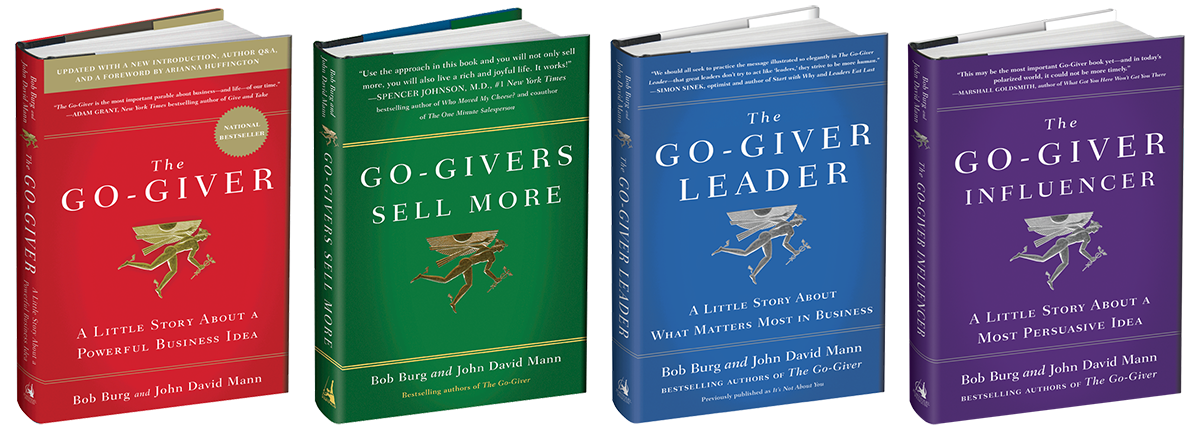
Dean: So, the Go-Giver Influencer, I read it and I thought it had an unexpected ending. Maybe I was shortsighted …
Bob: I think it surprised us as we were writing it.
Dean: [laughs] I felt like it was a story that had to do with framing, winning, but then more of an integrative negotiation. What would you say are the main nuggets that you want people to take away from it?
Those are the people who suffer from confirmation bias.
Bob: Well, I think it’s understanding a couple of things. One is that you can get the results you want when dealing with others with everyone coming away a winner and with everyone feeling good about themselves, about the situation, and about one another. When we talk about letting go of having to be right, that doesn’t mean that you don’t want to be right or that you don’t prefer to be right, that you don’t prepare and do all the things. It means that you also let yourself grow because when you let go of the attachment of having to be right, you put yourself into learners mode. You open yourself up to the idea that maybe you’re not 100% right, maybe there’s something that this person has to say that I should listen to, which doesn’t mean you have to agree with them, but it means you keep your mind open and you learn where they’re coming from. When you let yourself do this, a couple of things happen. One is that you actually gain more knowledge as opposed to the person that is so stuck in their idea, it’s almost like they’re saying my mind is made up, don’t confuse me with the facts. Those are the people who suffer from confirmation bias. They see only what they want to see and they ignore what doesn’t fit with their already held beliefs. When you let go of having to be right, you open yourself up to learning, which gives you an advantage. What it also does is that this other person can sense that they’re dealing with someone who isn’t just looking to be right at all costs, isn’t learning to be right at their expense, isn’t looking to be right by making them wrong, but is simply seeking the truth. When they see that about you, they’re much more likely to lessen their defensiveness and become much more open to you and open to your ideas.
Dean: I think the question I have to ask something because you just mentioned social media … was this book influenced in some way by the current polarized climate that social media has contributed to in many ways?
… respectfully without compromising your values.
Bob: You know Dean, it’s gotten to the point now where it’s not I’m right and you’re wrong, it’s I’m right and you’re evil. If you don’t agree with my point of view, you’re not just wrong, you have bad intent. And yes, this is something that while the book doesn’t discuss social media, the vitriolic, insulting exchanges that happen on social media and in real life too … It sort of said to John and me that the world has gotten to a point where communication has just broken down; discussion is no longer discussion and we wanted to see if we could make a difference in that way and maybe do our part to help the world see that you can always communicate to other people tactfully and respectfully without compromising your values. Again, it doesn’t mean that you have to agree, but you can still respect that person for being a human being. Actually, you become more influential, not less, when you do that.
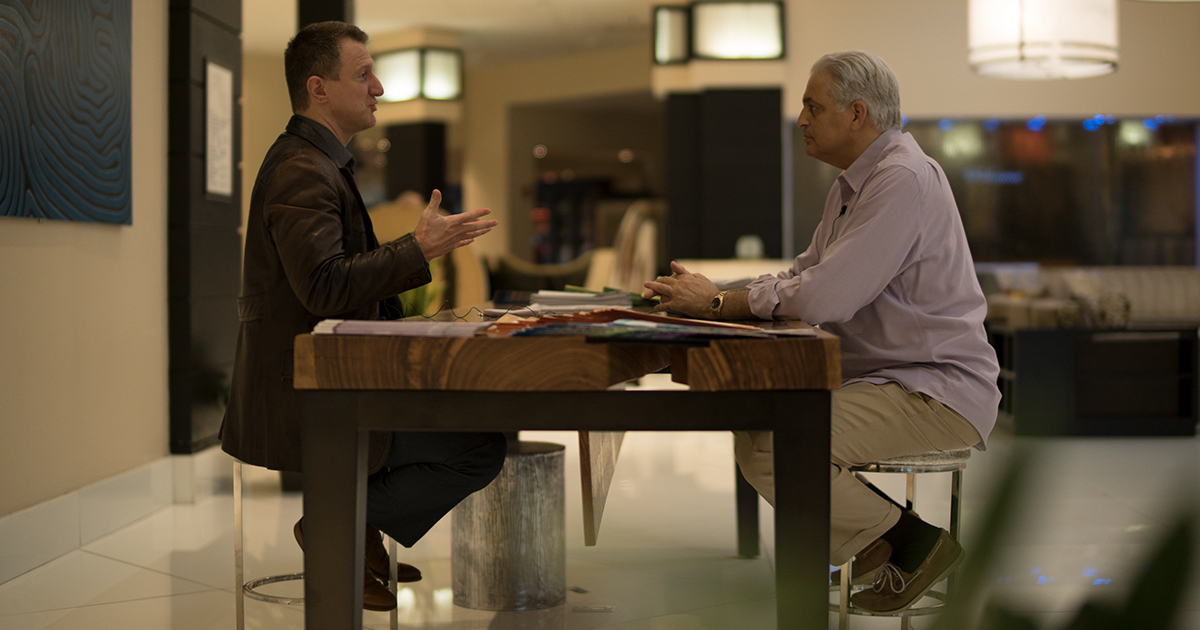
Dean: That is music to my ears. I’ve been working with an organizational psychologist for my business and I think that maybe in this digital world, communication is even more important because people just don’t talk to others the same in person as they do online. I used to think it was the anonymity that allowed people to do that, but now people put their name on it.
Bob: Well, it’s still a measure of safety. Yeah, they put their name on it, but it’s sort of like when two people are in a car and they make gestures at each other because they’re still protected by a car that’s going 60 miles per hour.
Dean: Very good analogy.
Bob: So you can safely insult someone and probably not have to pay the price.
Dean: Were any of the characters in the book inspired by somebody you know in real life?
Bob: Less in this one than in the other ones. The other ones, there were a few that were loosely based on or an amalgamation of people. This book sort of came off of the ‘How-To’ book that I wrote called Adversaries into Allies, which was a How-To book on the ultimate influence or the art of positive persuasion. That was inspired by my dad who to me is the man with the greatest people skills I ever saw. It was all because he genuinely cared about the other person, about making them feel genuinely good about themselves and I often say that the single most powerful people skill is a highly developed and authentic interest in the other person. So, while the book was inspired by the previous book I wrote, which was inspired by my dad, no there were no characters in this particular one that was based on people we knew.
Dean: Who was the most influential person that you’ve ever met and why would you select them?
Bob: Well, again I’d say my dad because I saw how he influenced so many people and how he helped so many people. Just by observing him, that has allowed me to help people communicate to with others in a way that’s more effective and more productive.

Dean: In the sales environment, is there anybody that was your mentor?
Bob: I learned about sales, formal sales, from a couple of books when I first started. One was by Zig Ziglar, one was by Tom Hopkins, and that was almost 40 years ago. I kept reading from there and kept studying and learning and watching. I would say Zig and Tom were the first two even though at that time, I’d never met them. I’d later get to be on stage with them and consider that to be a huge honor. They were my first two sales mentors.
Dean: Was speaking a natural extension of your sales career do you feel?
Bob: I think it was with mine, but I started in broadcasting. I started as a radio sportscaster, then a news guy. Then, I graduated from news to sales and then sales to management. I think when I started teaching it and teaching it from the stage, it’s kind of a combination of entertainment, education, and that sort of thing. I think it all kind of gelled together.
Dean: Let me ask you, do you have any tips for any aspiring speakers? It’s something that I’ve been doing kind of haphazardly upon request, but nothing that I’ve been doing with intention. Do you have any tips for somebody who wants to get out there and put themselves out there and do more speaking?
Bob: In terms of a professional speaker making a living from it?

Dean: Yes, you could say making a living from it.
Bob: Then I would say a couple of things. I’d say one is to join the National Speakers Association because that’s where the business of speaking is really learned. The other thing is I did an interview with a woman by the name of Jane Atkinson, who is one of the top speaker marketers, and she now teaches it and has a great book called Wealthy Speaker 2.0, but if someone will go to Burg.com/jane they can listen to the free audio and she does a magnificent job in this interview of really showing you what the speaking business is about.
I’m probably now more a writer who speaks.
Dean: Since I have now gotten to interview a Hall of Fame member of the National Speakers Association, I may name drop you once I connect with Jane, but I’ll definitely be checking that out. [Bob laughs] Is it a chicken and the egg with writing a book? What I mean by that is with regard to your speaking career, do you think it’s better to speak and then write or writing and being published first is a better way to get speaking gigs?
Bob: For this one, I can definitely answer with … it depends. I think it’s an individual thing. With me, I was speaking for a few years first. The reason I wrote my first book, Endless Referrals, was simply to position myself better in the marketplace. To be able to be more marketable, positioned as the expert, higher fees, blah blah blah, but there are other people who wrote books first and their books caught on so well that it was natural for them to begin speaking. We say that there are speakers who write and writers who speak. I definitely began as a speaker who wrote. I think as I’ve written and co-authored more books, I’m probably now more a writer who speaks.
Dean: I’ve found a lot of people on Twitter that say that you need to keep niching down on Twitter because people want to hear what you have to say because they can expect to hear about a certain subject matter. Do you think that holds true for books? Do you think that a writer needs to keep niching down as far as they can or how do you know what domain is a wide enough domain to have interest in and not niche down?
Bob: I’d say for speaking it makes perfect sense, the more niched that you go, the better. You want to become a celebrity, the expert, in your niche. People get scared and think that their message applies to everyone and that they would be losing potential business. No, what will happen is you’ll do a ton of business in that niche and you’ll naturally be asked to speak other places. You can then develop other niches, but yeah, I’d start with one and then drill down as deep as you can go. As far as a book, that’s a different thing. Yes, you want to be targeting a certain audience, but obviously, you can’t go too far into that niche or you’re not going to have enough of an audience, depending upon what kind of book it is. Now, if it’s a book that sells for $237 and it’s for a very, very specific thing, that’s fine. Most books, you don’t make a profit on the front end anyway, but if you want to have a big enough audience for your book, you can’t niche past the point that you’re going to have enough people reading it.
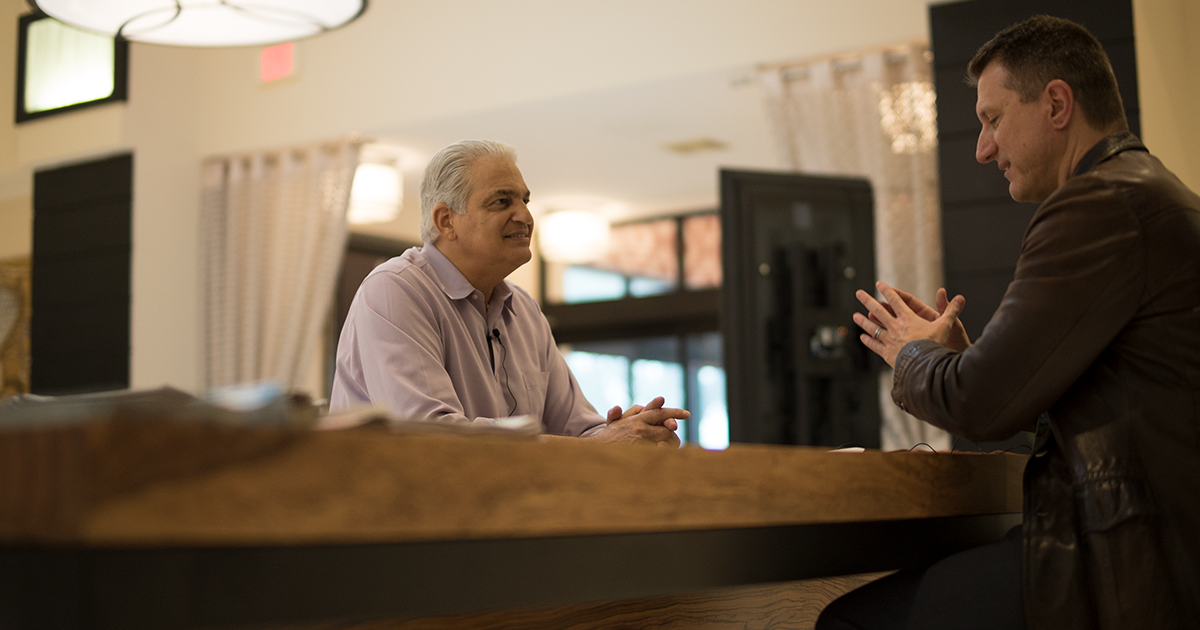
Dean: This interview will be coming out in the late summer. Do you have any projects that you have coming out on the horizon that you could share with us?
Bob: We’re developing an online course that we hope to have within the next few months, actually by October. We also have our certified Go-Giver Speaker Program in which people get trained to learn how to speak on the Go-Giver and so forth and my other materials, and we have our Go-Giver Entrepreneurs Academy. That’s pretty much what we’re doing.
Dean: Who is the online course for?
Bob: That will actually be for the same people who would read our books. For the entrepreneur, for the salesperson, it could be for a corporate leader as well. Our target market tends to be more entrepreneurs and salespeople, but we don’t niche so far that it’s only salespeople selling only this to this or that. We also get corporate leaders and schools and religious institutions because the message is something that anyone can hear, but we don’t tend to target those as much as we target sales and entrepreneurs.
Dean: If you could kind of look at yourself from a third person and step outside of yourself for a second, what would you say makes you an outrageously remarkable author and speaker?
Bob: I guess it would depend on what you mean by a remarkable author and speaker? As far as an author goes, I’m really not a remarkable author. My books with John David Mann, to me, John deserves the credit for the great storytelling. The fact that they’re parables, he’s a brilliant writer, I’m a How-To person. And my How-To books have done well, but they’re certainly not written anyway near to the expertise that the parables are written, but that’s John David Mann’s expertise. As far as a speaker goes, again, I’m a decent speaker. I think I deliver a good message, it’s entertaining and educational, but there are others out there who just blow me away as far as that kind of thing. I don’t have any delusions of grandeur. I know I’m good at what I do and I work hard at it.
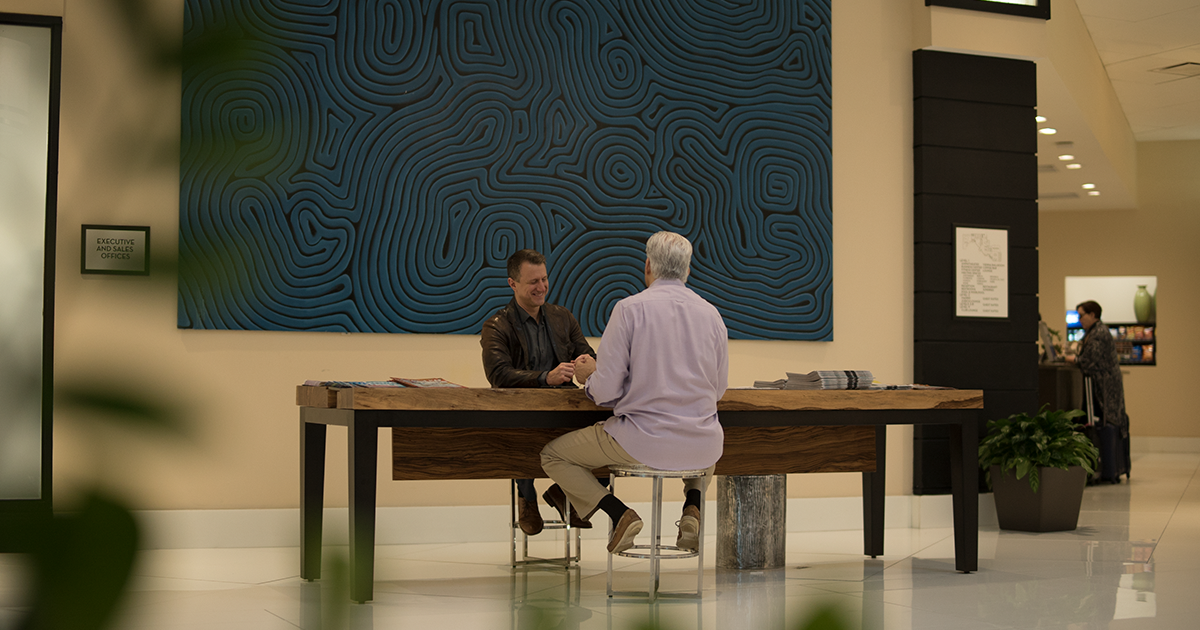
Dean: Can you move the humility aside for a second?
Bob: I don’t really feel that it’s humility. I think I do an honest assessment of myself. Hey, I have some areas in which I’m very, very confident. I’m confident getting on stage, it doesn’t mean I’m ever going to be as good as Scott Stratten or Scott McKain or Sally Hogshead. I’m going to be as good as Bob Burg.
Dean: I mean, that’s definitely good enough if I’m remembering your words so many years later.
Bob: Well, I appreciate it. In writing, I’m no John David Mann, but I get the privilege of working with John David Mann, so you know.
Dean: That’s awesome. Well, Bob, I appreciate it. It was great speaking with you.
Bob: Thanks, Dean. Thanks so much and congratulations again on the birth of your daughter.
____________
Check out Bob Burg’s website & make sure to connect with him on Twitter!
Photos by Pat Daley, check out his work here. Thanks for shooting on a short notice!
Want to keep up with Dean’s blog? Subscribe here to be an insider